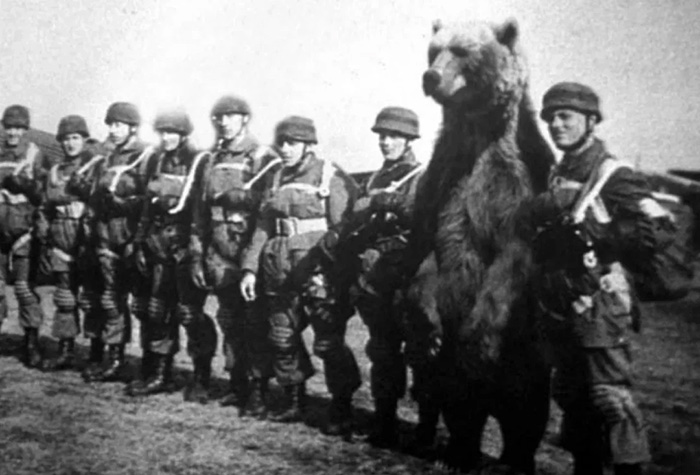
Wojtek the Bear, adopted by the 22nd Transport Company’s Artillery Division in the Polish II Corps in 1942, after an Iranian boy traded the bear for food. He served alongside his human comrades during the Italian Campaign
Wojtek, often referred to as the “Soldier Bear,” was a Syrian brown bear that played a unique and heartwarming role during World War II. Found as a young cub in Iran in 1942 after it was believed his mother had been shot by hunters, Wojtek was adopted by Polish soldiers of the 22nd Artillery Supply Company of the Polish II Corps. As he grew under the care of the soldiers, he became more than just a mascot; he became one of them.
The bond between Wojtek and the soldiers was so strong that when the unit was deployed to the Italian front, they faced a dilemma. Regulations stated that animals were not allowed to accompany military units unless they were working animals. In a clever move to keep their beloved bear with them, the soldiers officially enlisted Wojtek as a soldier, granting him his own rank and serial number.
Wojtek’s most notable contribution came during the Battle of Monte Cassino in 1944, one of the fiercest battles of the war. The bear, now fully grown, was seen carrying heavy mortar shells and other supplies to assist the troops, never once dropping a crate. His dedication and the morale boost he provided to the soldiers amidst the chaos of war made him a legendary figure.
After the war, the bond between Wojtek and the Polish soldiers remained strong. They were stationed in Scotland, and when the unit was demobilized in 1947, Wojtek was given a new home at the Edinburgh Zoo. He lived there until his death in 1963, often visited by the very soldiers he once served alongside.
Today, Wojtek’s legacy lives on. Statues in his honor can be found in cities like Edinburgh, Kraków, and even at the Imperial War Museum in London. His story, a testament to the resilience and camaraderie during a dark period in history, has been immortalized in books, documentaries, and songs.

Theodore Lee is the editor of Caveman Circus. He strives for self-improvement in all areas of his life, except his candy consumption, where he remains a champion gummy worm enthusiast. When not writing about mindfulness or living in integrity, you can find him hiding giant bags of sour patch kids under the bed.
